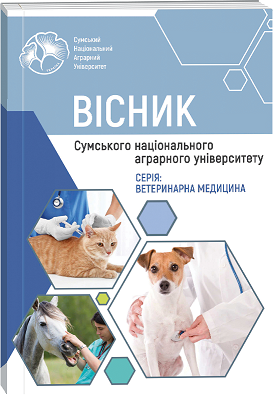STUDY OF THE INFLUENCE OF PROBIOTICS ON THE MICROBIOCENOSE OF THE INTESTINES OF PIGLETS
Abstract
An important factor for piglets is the maintenance of immunity due to the influence on the intestinal microflora and nonspecific immunity. The most responsible period for piglets is immediately after birth, when the morphological structure of the intestines (crypt height) and microbiome are formed. The research was carried out at the State Enterprise "DG of the Institute of Agriculture of the Northeast" of the National Academy of Sciences of Ukraine in March 2022. The breed of pigs is Big White + Landrace. The amount of Lactobacillus sp. in the intestinal contents of piglets of the experimental groups there was more B. coagulans by 200.0%, B. mucilaginosus by 379.0%, B. megaterium by 228.7%, B. pumilus by 17.8%, with B. amyloliquefaciense – by 26.0% compared to the control. Bifidobacterium sp. in all experimental groups it was within 107, compared to the control 105. The number of Clostridium p. with B. coagulans was less by 93.3%, with B. mucilaginosus – by 66.6%, with B. megaterium, B. pumilus and B. amyloliquefaciense – by 33.3% in comparison with the control. Escherichia coli, which has hemolytic activity, was isolated from the feces of piglets with B. pumilus, B. amyloliquefaciense and control groups. The amount of Escherichia coli was isolated in a smaller amount in the first experimental group by 86.95%, the second by 88.0%, the third by 76%, the fourth by 65.2%, the fifth by 34.78%, compared with control Bacteria of the genera Salmonella and Pseudomonas were not isolated in the faecal masses of piglets. The number of yeast-like fungi in the samples of the experimental and control group of piglets was the same, less than 10 in 1cm3. Enterobacteriaceae were isolated from the piglets of the experimental groups by 98% less, compared to the control. Staphylococci were isolated in the first, second, fourth and fifth experimental groups in the same amount and 85.7% less, compared to the control. Research has established that the use of probiotic strains of Bacillus coagulans, Bacillus megaterium and Bacillus mucilaginosus had a positive effect on the content of beneficial microflora in the intestines of piglets and inhibited the growth of opportunistic microflora.
References
2. Bajagai, Y. S., Klieve, A. V., Dart, P. J., & Bryden, W. L. (2016). Probiotics in animal nutrition: production, impact and regulation. FAO https://www.fao.org/documents/card/en?details=e6232d34-e38e-4b4c-9a45-70fa75f7da23/
3. Canibe, N., Højberg, O., Kongsted, H., Vodolazska, D., Lauridsen, C., Nielsen, T. S., & Schönherz, A. A. (2022). Review on Preventive Measures to Reduce Post-Weaning Diarrhoea in Piglets. Animals : an open access journal from MDPI, 12(19), 2585. https://doi.org/10.3390/ani12192585
4. Chang, C. H., Teng, P. Y., Lee, T. T., & Yu, B. (2019). The effects of the supplementation of multi-strain probiotics on intestinal microbiota, metabolites and inflammation of young SPF chickens challenged with Salmonella enterica subsp. enterica. Animal science journal = Nihon chikusan Gakkaiho, 90(6), 737–746. https://doi.org/10.1111/asj.13205
5. Daudelin, J. F., Lessard, M., Beaudoin, F., Nadeau, E., Bissonnette, N., Boutin, Y., Brousseau, J. P., Lauzon, K., & Fairbrother, J. M. (2011). Administration of probiotics influences F4 (K88)-positive enterotoxigenic Escherichia coli attachment and intestinal cytokine expression in weaned pigs. Veterinary research, 42(1), 69. https://doi.org/10.1186/1297-9716-42-69
6. Kreuzer-Redmer, S., Bekurtz, J. C., Arends, D., Bortfeldt, R., Kutz-Lohroff, B., Sharbati, S., Einspanier, R., & Brockmann, G. A. (2016). Feeding of Enterococcus faecium NCIMB 10415 Leads to Intestinal miRNA-423-5p-Induced Regulation of Immune-Relevant Genes. Applied and environmental microbiology, 82(8), 2263–2269. https://doi.org/10.1128/ AEM.04044-15
7. Kritas, S. K., Marubashi, T., Filioussis, G., Petridou, E., Christodoulopoulos, G., Burriel, A. R., Tzivara, A., Theodoridis, A., & Pískoriková, M. (2015). Reproductive performance of sows was improved by administration of a sporing bacillary probiotic (Bacillus subtilis C-3102). Journal of animal science, 93(1), 405–413. https://doi.org/10.2527/jas.2014-7651
8. Kwoji, I. D., Aiyegoro, O. A., Okpeku, M., & Adeleke, M. A. (2021). Multi-Strain Probiotics: Synergy among Isolates Enhances Biological Activities. Biology, 10(4), 322. https://doi.org/10.3390/biology10040322
9. Liu, H., Wang, S., Zhang, D., Wang, J., Zhang, W., Wang, Y., & Ji, H. (2020). Effects of dietary supplementation with Pediococcus acidilactici ZPA017 on reproductive performance, fecal microbial flora and serum indices in sows during late gestation and lactation. Animal bioscience, 33(1), 120–126. https://doi.org/10.5713/ajas.18.0764
10. Nam, N. H., Truong, N. D., Thanh, D. T. H., Duan, P. N., Hai, T. M., Dao, B. T. A., & Sukon, P. (2022). Bacillus subtilis QST 713 Supplementation during Late Gestation in Gilts Reduces Stillbirth and Increases Piglet Birth Weight. Veterinary medicine international, 2022, 2462241. https://doi.org/10.1155/2022/2462241
11. Poulsen, A. R., Jonge, N., Nielsen, J. L., Højberg, O., Lauridsen, C., Cutting, S. M., & Canibe, N. (2018). Impact of Bacillus spp. spores and gentamicin on the gastrointestinal microbiota of suckling and newly weaned piglets. PloS one, 13(11), e0207382. https://doi.org/10.1371/journal.pone.0207382
12. Saladrigas-García, M., Solà-Oriol, D., López-Vergé, S., D'Angelo, M., Collado, M. C., Nielsen, B., Faldyna, M., Pérez, J. F., & Martín-Orúe, S. M. (2022). Potential effect of two Bacillus probiotic strains on performance and fecal microbiota of breeding sows and their piglets. Journal of animal science, 100(6), skac163. https://doi.org/10.1093/jas/skac163
13. Tian, M., Li, Q., Zheng, T., Yang, S., Chen, F., Guan, W., & Zhang, S. (2023). Maternal microbe-specific modulation of the offspring microbiome and development during pregnancy and lactation. Gut microbes, 15(1), 2206505. https://doi.org /10.1080/19490976.2023.2206505
14. Wang, Y. C., Hu, S. Y., Chiu, C. S., & Liu, C. H. (2019). Multiple-strain probiotics appear to be more effective in improving the growth performance and health status of white shrimp, Litopenaeus vannamei, than single probiotic strains. Fish & shellfish immunology, 84, 1050–1058. https://doi.org/10.1016/j.fsi.2018.11.017 15. Zhang, Q., Li, J., Cao, M., Li, Y., Zhuo, Y., Fang, Z., Che, L., Xu, S., Feng, B., Lin, Y., Jiang, X., Zhao, X., & Wu, D. (2020). Dietary supplementation of Bacillus subtilis PB6 improves sow reproductive performance and reduces piglet birth intervals. Animal nutrition (Zhongguo xu mu shou yi xue hui), 6(3), 278–287. https://doi.org/10.1016/j.aninu.2020.04.002

 ISSN
ISSN  ISSN
ISSN 



